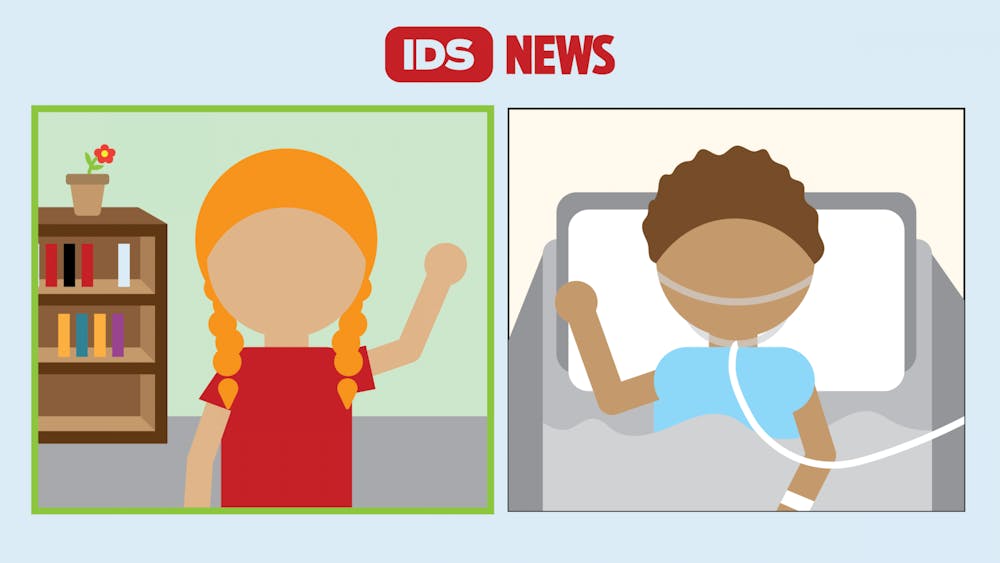Josh Coolman sits down in his office. Photos of his family members are spread throughout the room. Christmas lights, which he turns on when he needs some color, brighten the space and distract him from the fact that there are no windows. He turns on music for solace. Recently, he’s been listening to “Be Still” by The Killers.
Coolman, staff chaplain at Riley Hospital for Children at IU Health in Indianapolis, is one of hundreds of thousands of health care workers fighting an overworked system during the COVID-19 pandemic. Chaplains provide spiritual care to patients and their families and serve as a guide for them to work through complex emotions.
“I don’t remember a time when a parent was scared for their own safety to go into a room,” Coolman said. “I try to open up conversations and let them tell me how their day is going.”
Coolman works in multiple departments, including the pediatric intensive care unit, oncology and burn units. The hard days come in the form of bad test results or patients being told they can’t go home yet. The good days are going-home celebrations and remission announcements.
Self-care has become a necessity for him since the pandemic began, Coolman said. He works harder to call family members and uses video apps on his phone to talk with friends. He learned how to send video messages, which he said brings him joy.
“I’m tired of being anxious when I go to the grocery store,” he said. “Hopefully it won’t be too long before going to the grocery store won’t seem like such a scary thing.”
Shawn Gerber, IU Health Bloomington Hospital spiritual care and chaplaincy director, said his team has had to adapt to new hospital protocols which, while necessary, directly conflict with how the team typically works. The chaplains have had to figure out how to connect and help patients with their emotions while talking through a phone or video chatting. He said because the protocols change so rapidly due to learning more information about COVID-19, what’s safe one week isn’t the next.
“It's like flying an airplane while building it,” Gerber said.
Gerber said the moment he realized this would be unlike anything he had seen before was during an end-of-life visit he did with a family near the beginning of the pandemic whose father had contracted COVID-19. He said balancing giving the family space to visit their loved one and the family’s safety was incredibly difficult. He had to work to make sure the man’s daughters wouldn’t get sick saying goodbye, but also ensure they were comfortable enough to spend time with their dad one last time.
“It's heartbreaking to see what people are going through and the pain that they're in,” he said.
Melody Kinder Carpenter, a chaplain at IU Health Bloomington Hospital, starts her day with a devotional. Other times she’ll read scripture, focusing on a specific topic for the day. It’s been a welcome respite.
The pandemic has affected her ability to connect with patients, Kinder Carpenter said. Chaplains are people-focused, she said, and not being able to give a reassuring touch or a hand to hold is hard. Technology has helped bridged the gap, but it can’t replace human contact.
“We want to be there with the patient,” she said.
Kinder Carpenter said the pandemic made her realize how much she relied on sight. She said she could read a room when she walked in and figure out what patients and their families were struggling with. Now, she does visits through video and phone calls.
She has to focus on people's voices now. Anger is easy to hear, she said, but a more complex emotion, such as sadness about to tip into tears, requires a much higher attention to detail to pick up on.
“My awareness has been heightened in the midst of this,” Kinder Carpenter said.
Feelings of isolation, which are hard to detect in the first place, are easier to hide and amplified right now, Gerber said. Part of a chaplain’s job is to reach out and let patients and their families know they have people they can talk to. Despite initial awkwardness, many people have taken to it well.
“I've really been inspired by the human spirit, by people's souls, by people’s faith,” he said. “That's really carrying them through these times.”




